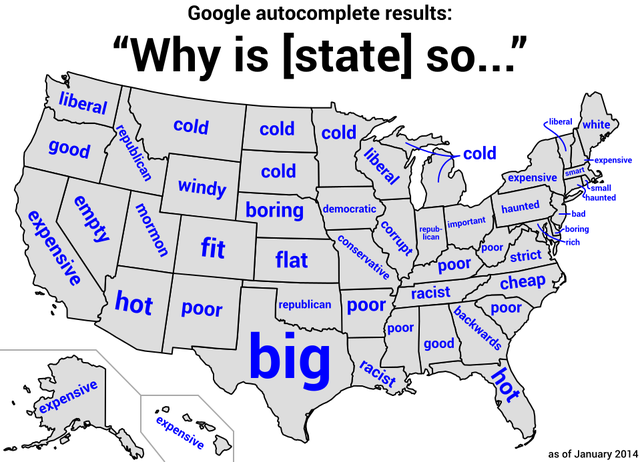“Why is Louisiana so racist?” is the most common question Internet users ask Google, according to the Twitter account @Amazing_Maps.
While states like Massachusetts and Texas got random or positive adjectives — “smart” and “big,” respectively — Louisiana’s autocomplete came out as “racist.”
Racism has always been a topic of much controversy in the southern states, but for some reason only Louisiana and fellow southern state Tennessee are still viewed as racist states by Google users.
Gov. Bobby Jindal wrote in POLITICO last August, “minorities just cling to their heritage and place too much emphasis on their ‘separateness.’” But, I don’t think it is just minorities.
I think that the issue of race is instilled in all Americans from southern states since birth.
Parents and social expectations raise us to see race as a way that people are different, and in a world where different is bizarre, we are all encouraged to stick to the status quo.
The racist aspect of this reality may be dissipating, but there is still a silent encouragement toward the “separate but equal” lifestyle.
“It’s OK to be different, but don’t expect to be fully accepted into the clan” is the non-verbal rule, and perception plays a big role when enforcing it.
In my case, due to my bilingual education — as well as my life-long addiction to American television — I have had a pretty good American accent since before I moved to the United States from Venezuela almost five years ago.
Other than the gasps of shock that some people get when they find out my name and the “Why are you white?” or “Say something in Spanish” jokes, I haven’t been subjected to many racial comments ever since I came to Baton Rouge to attend LSU.
My mother didn’t have the same experience, however.
During one of her visits in December, my mother tried to do some Christmas shopping at the Mall of Louisiana. Having not activated her credit card, she had been paying by checks for all of her expenses.
However, in one particular store, she wasn’t allowed to pay by check because her form of identification was a passport and not a driver’s license.
In other stores, she would usually talk to the manager, and they would accept the passport but in this case she was rejected.
Obviously, this wasn’t a race issue, but it’s just one of the many examples of how people aren’t open to things that are different. A driver’s license and a passport are two official documents that serve to prove who we are, but because not everyone has a passport, it’s not accepted in some Louisiana establishments.
Maybe if I’d done the talking at the store, the lady wouldn’t have brushed us off without even looking at my mother’s passport, but since she was trying to explain in her broken English the reason why she didn’t have a license, the worker dismissed us and told us there was nothing she could do.
With situations like this, I wonder if it would be a more appropriate question to ask Google “Why is Louisiana so ignorant?”
According to CollegeFactual.com, 22.6 percent of the LSU student body belongs to a non-white race, and that number will keep growing over the next few years, including the number of students that come from other countries.
Louisiana has to accept this reality and change its policies to accept the growing international and multicultural population.
It’s time that society stops teaching us to steer clear from what’s different. The longer Louisiana clings to old-school ideas of how the world should be, the longer it will be perceived in a negative light by Google aficionados.
Jose Bastidas is a 20-year-old mass communication junior from The Woodlands, Texas.
This interactive map shows the top Google autocomplete for different NCAA conference schools. Click the dots to view the each school’s results. Use the zoom in/out control to view text that is cut off screen.
Click here to see our mobile version.
Opinion: Google autocomplete shows users equate state to racism
February 2, 2014
A screenshot of the Google autocomplete map shown on Business Insider.
More to Discover










